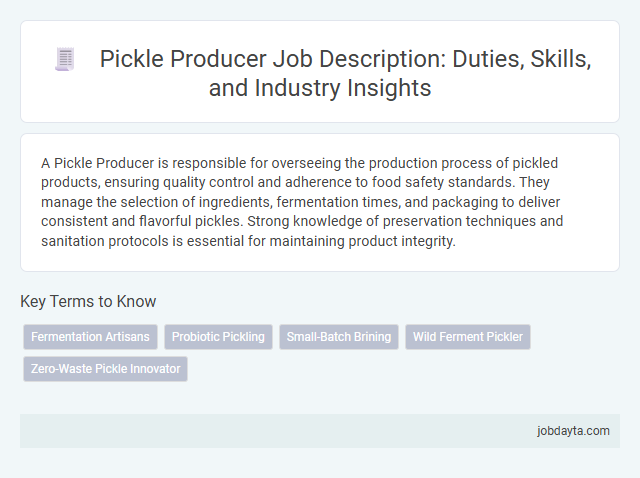A Pickle Producer is responsible for overseeing the production process of pickled products, ensuring quality control and adherence to food safety standards. They manage the selection of ingredients, fermentation times, and packaging to deliver consistent and flavorful pickles. Strong knowledge of preservation techniques and sanitation protocols is essential for maintaining product integrity.
Overview of a Pickle Producer Role
A pickle producer specializes in the preparation and preservation of cucumbers and other vegetables through fermentation or brining. This role involves selecting quality raw materials and applying precise methods to achieve consistent flavor and texture.
A key responsibility is managing the fermentation process to ensure safety and maintain product standards. The producer also oversees packaging, storage, and compliance with food safety regulations to deliver fresh, high-quality pickles to the market.
Key Responsibilities and Daily Duties
As a Pickle Producer, you manage the entire process of creating high-quality pickled products. Your role ensures consistent flavor, safety, and efficient production flow.
- Ingredient Preparation - You select and prepare fresh vegetables and spices to maintain product standards.
- Fermentation Monitoring - You oversee the fermentation process, checking pH levels and adjusting brine solutions as needed.
- Quality Control - You inspect finished products for taste, texture, and packaging integrity before distribution.
Essential Skills for Pickle Production
Mastering essential skills in pickle production ensures high-quality, flavorful products that meet market demands. Knowledge of fermentation techniques, ingredient selection, and sanitation practices is critical in maintaining consistency and safety. Your ability to control these factors directly impacts the shelf life and taste of the pickles, making expertise indispensable for any pickle producer.
Understanding the Pickle Production Process
Pickle production involves selecting fresh cucumbers, washing them thoroughly, and preparing a brine solution with water, salt, and vinegar. Fermentation plays a key role, where beneficial bacteria convert sugars into lactic acid, preserving the cucumbers and creating the distinctive tangy flavor. You can appreciate the craftsmanship and attention to detail required at each step to ensure high-quality, flavorful pickles.
Quality Control and Safety Standards
Quality control and safety standards are essential for a pickle producer to ensure product consistency and consumer trust. Your satisfaction relies on rigorous inspection and adherence to strict hygiene protocols throughout the production process.
- Raw Material Inspection - All cucumbers and spices undergo thorough examination to guarantee freshness and contamination-free ingredients.
- Sanitary Processing Environment - Production facilities maintain strict sanitation measures to prevent bacterial contamination and ensure safe handling.
- Regular Laboratory Testing - Finished pickles are tested for pH levels, microbial presence, and chemical residues to comply with food safety regulations.
Equipment and Tools Used in Pickle Manufacturing
Pickle production requires specialized equipment to ensure consistent quality and safety. Using the right tools can significantly enhance your efficiency in the manufacturing process.
- Fermentation tanks - These airtight containers maintain controlled environments essential for pickle fermentation.
- Brine preparation systems - Equipment that accurately mixes salt and water to create consistent brine solutions for pickling.
- Filling and packing machines - Automated tools designed to fill jars or bottles with pickles precisely and seal them to preserve freshness.
Investing in advanced pickle manufacturing equipment streamlines production and improves product quality.
Industry Trends in Pickle Production
What are the current industry trends in pickle production? The pickle industry is experiencing a surge in demand for organic and non-GMO products as consumers prioritize health and sustainability. Innovations in fermentation technology and the use of diverse vegetable varieties are driving product differentiation and market growth.
Career Growth and Opportunities in Food Production
Pickle producers play a vital role in the food production industry by transforming raw vegetables into flavorful, preserved products. This career offers a blend of traditional methods and modern technology, fostering skill development in fermentation and quality control.
Opportunities for career growth include advancing to roles such as production supervisor, quality assurance manager, or product development specialist. The expanding market for artisanal and organic pickles creates increased demand for innovative producers and industry experts.
Necessary Educational and Certification Requirements
Starting a career as a pickle producer requires a solid understanding of food safety and preservation techniques. You must acquire knowledge in fermentation processes and proper hygiene standards to ensure product quality.
Obtaining a Food Handler's Certificate is essential, demonstrating your competency in food safety practices. Pursuing additional certifications, such as HACCP (Hazard Analysis Critical Control Point), enhances your credibility and ensures compliance with industry regulations. Formal education in food science or culinary arts can further strengthen your expertise, preparing you to manage production effectively.
Challenges and Rewards of Being a Pickle Producer
| Aspect | Details |
|---|---|
| Challenges |
|
| Rewards |
|
Related Important Terms
Fermentation Artisans
Fermentation artisans specialize in crafting pickles using traditional microbial fermentation techniques that enhance flavor complexity and nutritional value. Their expertise in controlling natural bacteria and yeast cultures results in unique, probiotic-rich pickles cherished for both taste and health benefits.
Probiotic Pickling
Probiotic pickling enhances traditional fermentation by promoting beneficial bacteria like Lactobacillus, which improve gut health and boost immunity. Leading pickle producers use natural fermentation techniques without preservatives, ensuring rich probiotic content and authentic flavor profiles.
Small-Batch Brining
Small-batch brining enables pickle producers to maintain precise control over flavor profiles and texture, ensuring consistently fresh and high-quality products. This artisanal approach emphasizes natural fermentation processes, often resulting in distinctive, handcrafted pickles with superior taste and nutritional benefits.
Wild Ferment Pickler
Wild ferment picklers harness natural bacteria such as Lactobacillus to create probiotic-rich, tangy pickles without added starter cultures. This traditional fermentation technique enhances flavor complexity and promotes gut health by preserving vegetables in a controlled anaerobic environment.
Zero-Waste Pickle Innovator
Zero-waste pickle innovators revolutionize the food industry by transforming vegetable scraps and brine remnants into flavorful, sustainable products, significantly reducing food waste. These producers employ innovative fermentation techniques and eco-friendly packaging to create high-quality pickles while minimizing environmental impact.
Pickle Producer Infographic

 jobdayta.com
jobdayta.com